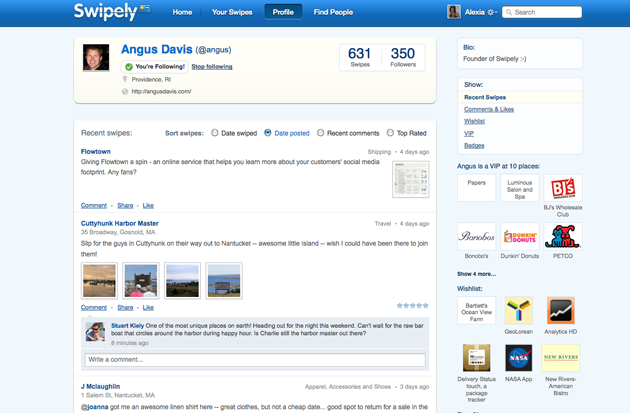 Providence, Rhode Island-based Swipely, like a Blippy without the prices, has made its transaction tracking service available to the public today, officially leaving private beta.
Providence, Rhode Island-based Swipely, like a Blippy without the prices, has made its transaction tracking service available to the public today, officially leaving private beta.
Swipely, which aggregates social purchasing data, does not reveal pricing on transactions as it wants the actual “swipes,” or what you purchased and where you purchased it, to be the focus of attention. “With Swipely, we’ve created the easiest way for people to start and share these conversations online with their friends” says CEO and former Tellme founder Angus Davis.
Swipely also prides itself on being more secure than other transaction tracking services, especially in the not Google indexing credit card numbers arena.
Some of the Swipely features open to the public today:
* Importing receipts from over 6,000 e-commerce retailers, allowing you to share these “swipes” on Facebook and Twitter.
* Integration of purchase data with geo-locational services.
* The ability to easily view your friends’ buying patterns and figure out what you should be spending money on (unless you’re friends with Chris Sacca, in which case, Chris, why are you buying all those wigs?).
* Badges and social rewards, based not only on amount spent, but frequency of purchase.
While the end goal of Swipely, like Blippy, is to get you to spend more money, a substantial part of the service’s future, according to Davis, is eventual integration into existing store loyalty services in order to make it easier to save, “You’re already swiping your card at places, so no one has to change their behavior.”
To celebrate today’s launch, Swipely is offering free music, free books, coffee and more to users who earn the “Turntable,” “Bookworm” and “App Storeaholic” badges over the next four weeks.
And while Davis realizes that the concept of badges might be played out, he thinks the idea might be good for Swipely, “everybody’s doing badges now, but the truth of the matter is that what we’re doing that’s different is that we’re tied into the payment network.”
Davis is also aware that the e-commerce space is saturated and ripe for disruption; “What’s really interesting about social commerce is that you’ve already seen the content industry be disrupted. There’s a general belief that commerce will be next, there’s no one in the space who has really cracked the code. We’re all still trying to figure it out and get feedback.”
Funded by Index Ventures, Greylock Partners, First Round Capital, to the tune of $7.5 million, Swipely might be uniquely poised to crack that code.
